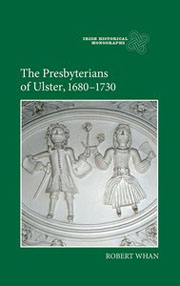Book contents
- Frontmatter
- Contents
- List of Illustrations
- Acknowledgements
- Colophon
- List of Abbreviations
- Editorial note
- Map showing principal places mentioned in the text and approximate presbytery boundaries (1704)
- Introduction
- 1 Ministers
- 2 Gentry
- 3 Merchants and Commerce
- 4 The Professions
- 5 The Lower Orders
- 6 Organisation and Religious Practice
- Conclusion
- Bibliography
- Index
Conclusion
Published online by Cambridge University Press: 05 March 2014
- Frontmatter
- Contents
- List of Illustrations
- Acknowledgements
- Colophon
- List of Abbreviations
- Editorial note
- Map showing principal places mentioned in the text and approximate presbytery boundaries (1704)
- Introduction
- 1 Ministers
- 2 Gentry
- 3 Merchants and Commerce
- 4 The Professions
- 5 The Lower Orders
- 6 Organisation and Religious Practice
- Conclusion
- Bibliography
- Index
Summary
Ulster Presbyterians were drawn from all social groups below the aristocracy. The majority lived at the middling and lower levels, and this present study has for the first time brought into focus, in detail, who these non-clerical, lesser Presbyterians actually were and how they contributed to the Presbyterian denomination and society more widely. During the period the social profile of Presbyterianism was undergoing transformation. The linen industry was slowly beginning to change the economic context, and would lead to social mobility, though developments did not come to full fruition until the decades after 1730. Instead the most important social change in this period was the decline of the Presbyterian gentry. The number of Presbyterian gentry families in Ulster was never huge, but in the generation after the enactment of the sacramental test clause, in 1704, the number declined sharply. Conforming was not confined to the landed elite and extended, to a lesser degree, to the leading mercantile families and professionals. The impact, however, was more noticeable among the Presbyterian gentry.
Afterwards the gap left in the social leadership by the defection of the gentry was filled by the ministers and merchants. Though not the only Presbyterians to receive a higher education, ministers had always been the dominant group among the Presbyterians’ intellectual elite.
- Type
- Chapter
- Information
- The Presbyterians of Ulster, 1680-1730 , pp. 199 - 201Publisher: Boydell & BrewerPrint publication year: 2013



